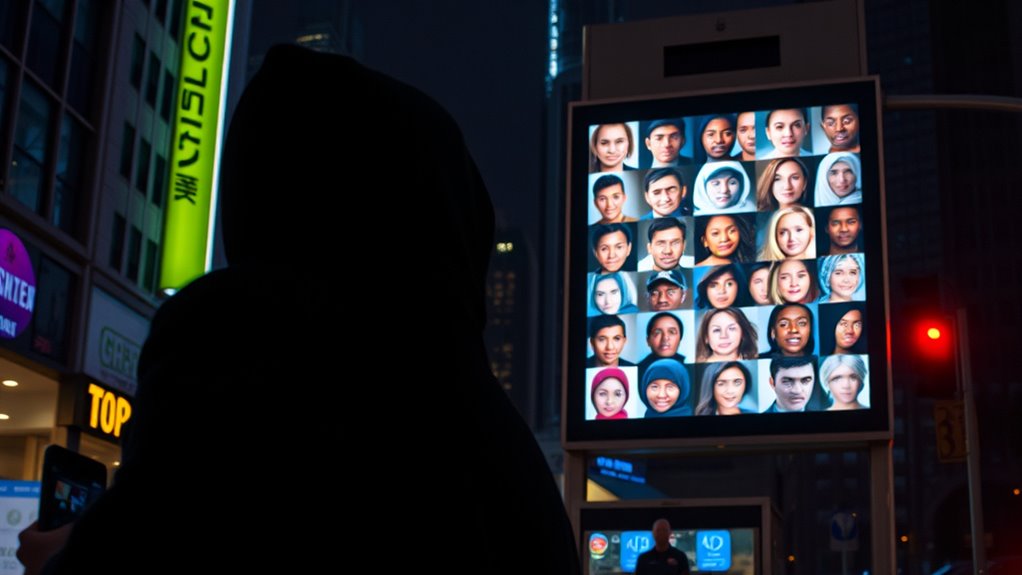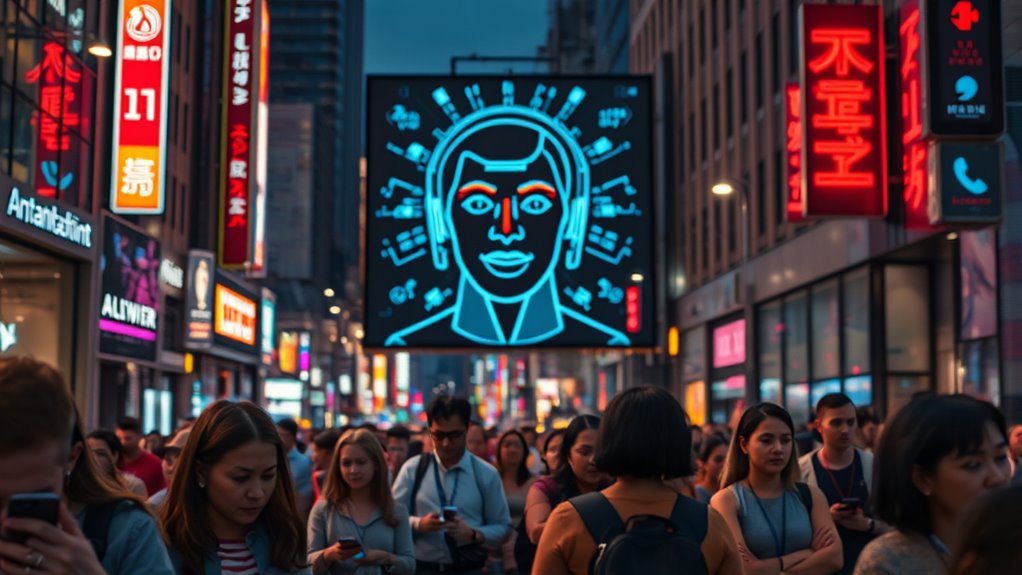Facial recognition technology raises serious ethical issues around privacy, bias, and civil liberties. You might worry about how your biometric data is collected, stored, and shared without explicit consent, risking misuse or breaches. The system’s fairness depends on diverse data; otherwise, biases can lead to unfair treatment or wrongful actions. Transparency and accountability are essential to protect your rights and prevent mass surveillance. Exploring this topic further helps you understand the complex balance between innovation and ethics.
Key Takeaways
- Privacy concerns arise from unauthorized collection, storage, and potential misuse of biometric data without user consent.
- Bias in algorithms can lead to unfair treatment and discrimination against marginalized groups.
- Transparency and accountability are essential to inform individuals about data usage and prevent misuse.
- Facial recognition systems are vulnerable to cyberattacks, risking data breaches and privacy violations.
- Ethical deployment requires balancing security benefits with protecting civil liberties and individual rights.

Facial recognition technology has rapidly advanced and become integrated into many aspects of daily life, but its ethical implications raise urgent questions. As you encounter this technology in places like airports, smartphones, and security systems, you might wonder about the privacy concerns it entails. This tech collects and analyzes your facial features, often without explicit consent, raising fears about how your biometric data is stored, used, and shared. You could be concerned that your personal information might be accessed by unauthorized parties or used for purposes you didn’t agree to, such as targeted advertising or government surveillance. These privacy issues are compounded by the potential for data breaches, which could leave your sensitive information vulnerable. As such, safeguarding privacy becomes a critical issue in the ongoing development and deployment of facial recognition systems. Additionally, the cybersecurity vulnerabilities associated with facial recognition platforms can make them attractive targets for hackers seeking to exploit personal data.
Another major ethical challenge involves bias mitigation. Facial recognition algorithms are only as good as the data they’re trained on, and if that data lacks diversity, the technology can produce biased results. You might notice that some systems work accurately for certain demographic groups but falter with others, leading to false positives or negatives. This bias can lead to unfair treatment, wrongful arrests, or exclusion, especially for marginalized communities. To address this, developers need to prioritize bias mitigation in their algorithms, ensuring they are trained on diverse, representative datasets. By doing so, you help create a more fair and equitable system that doesn’t disproportionately impact specific groups. Ethical use of facial recognition technology requires ongoing efforts to identify and reduce biases, fostering trust and fairness in its application.
Furthermore, transparency plays a crucial role in addressing ethical concerns. You should be informed about when and how facial recognition is used, what data is collected, and who has access to it. Clear policies and regulations can help ensure accountability, giving you confidence that your rights are protected. Consent is equally important; you deserve to know if your face is being scanned and for what purpose, with options to opt out where possible. Ethical considerations also extend to the potential for misuse, such as mass surveillance or tracking dissenters, which can threaten civil liberties. As you navigate a world where facial recognition becomes more commonplace, advocating for responsible policies that balance innovation with respect for individual rights becomes essential.
Frequently Asked Questions
How Accurate Is Facial Recognition Technology Across Different Demographics?
You might wonder how accurate facial recognition technology is across various demographics. It often suffers from accuracy biases, especially among different racial and gender groups, leading to demographic disparities. These biases mean the technology can misidentify individuals more frequently in certain populations, raising concerns about fairness. Recognizing these accuracy disparities helps you understand the need for ongoing improvements to guarantee the technology works reliably for everyone, regardless of demographic differences.
What Legal Regulations Govern Facial Recognition Use Worldwide?
You should know that legal regulations on facial recognition vary worldwide, often addressing privacy concerns and data protection. Some countries, like the EU, enforce strict laws requiring consent and data security, while others have minimal regulations. You need to stay informed about local laws to guarantee your use of facial recognition complies with privacy standards and protects individuals’ data, helping you avoid legal issues and respecting personal privacy rights.
How Can Individuals Control Their Facial Data Privacy?
To control your facial data privacy, you should actively manage your consent and be aware of when facial recognition is used. Use consent management tools to restrict or allow data collection and request data anonymization whenever possible to protect your identity. Stay informed about privacy policies and rights in your jurisdiction, and consider using privacy-focused apps or settings that help limit facial data sharing, giving you more control over your personal information.
Are There Alternatives to Facial Recognition for Security Purposes?
Imagine you’re in 1928, pondering security options—today, you have alternative methods beyond facial recognition. You can rely on traditional security measures like fingerprint scans, PIN codes, or smart card access, which address privacy concerns better than facial recognition. These alternatives provide effective security without invasive data collection. By choosing these options, you prioritize your privacy and reduce risks associated with biometric data misuse, making your security both smarter and safer.
What Are the Long-Term Societal Impacts of Widespread Facial Recognition?
You might not realize it now, but widespread facial recognition could substantially shape society long-term. Privacy concerns would intensify as surveillance implications grow, making it harder to maintain personal freedom. You could feel constantly watched, leading to self-censorship and reduced privacy in public spaces. Over time, this technology could erode trust, create social divisions, and challenge our rights, fundamentally altering how society functions and how free you feel in everyday life.
Conclusion
Imagine walking into a crowded city street, where every face is being watched and recorded. It’s like living under a constant spotlight, with your every move scrutinized. As you consider the ethics of facial recognition, remember that technology isn’t neutral — it shapes our freedoms and privacy. With over 1,000 facial recognition incidents reported in 2022 alone, it’s clear we must navigate this moral maze carefully. Your choices today will define our society’s future of trust and liberty.









